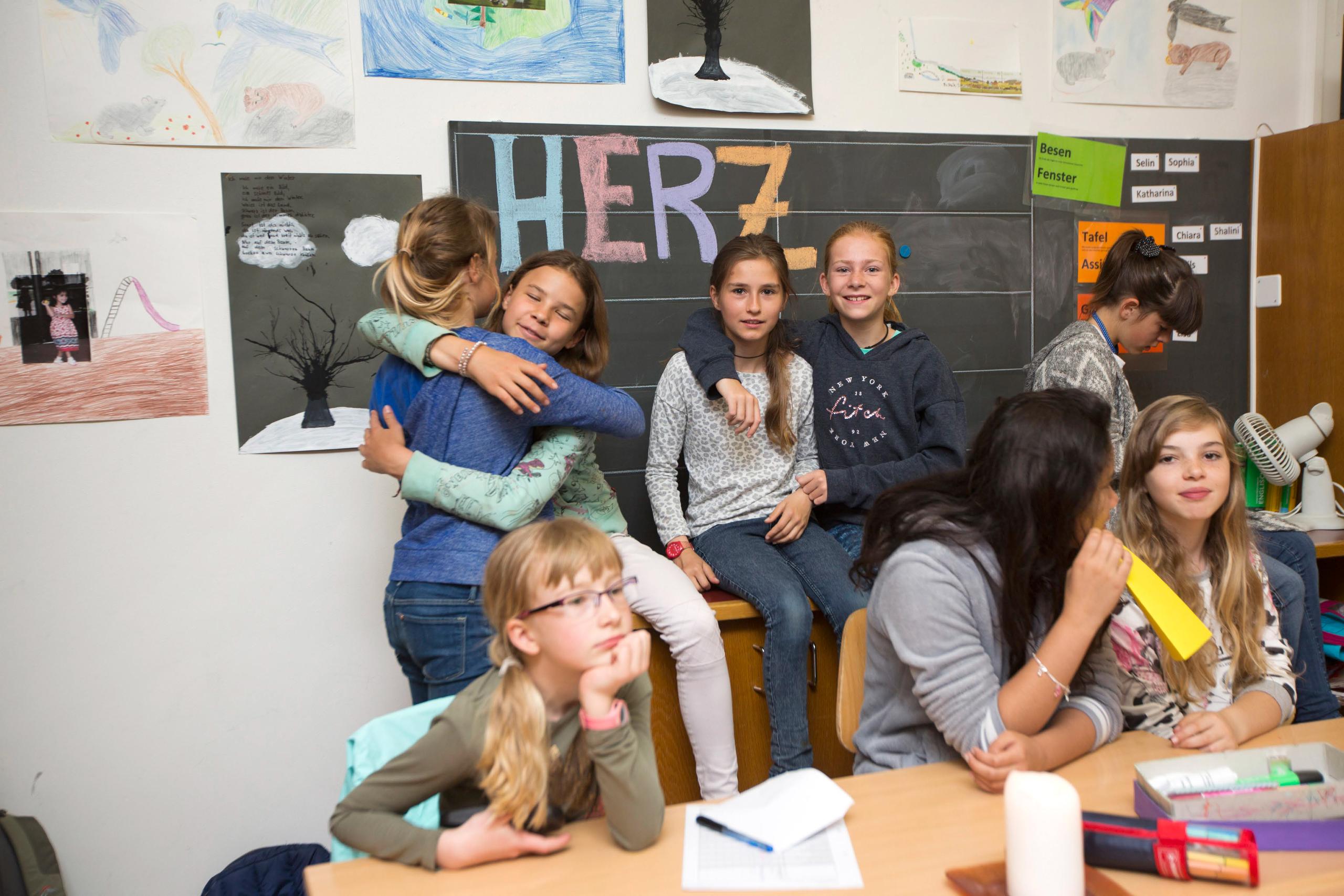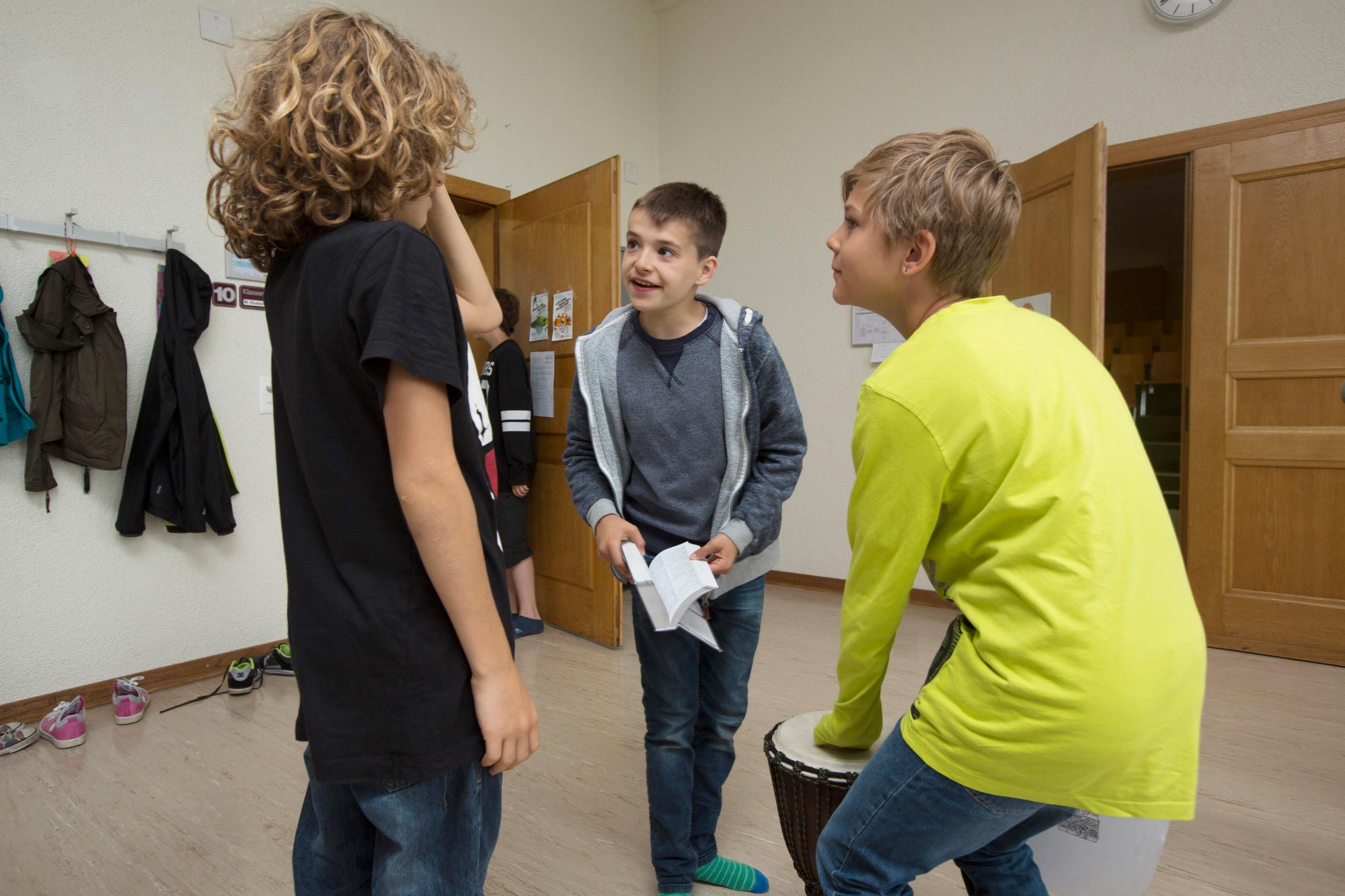
The Swiss school as a multilingual playground

While the debate on language learning continues to provoke strong reactions in Switzerland, linguistic exchanges are on the rise, although not as much as the government would like. On the ground, however, teachers are taking things into their own hands.
They are between 11 and 12 years of age and live within 200 kilometres of each other. But in Switzerland such a distance is enough to separate two very different linguistic worlds.
In mid-May, the pupils of Rachel Dällenbach, a teacher from Fribourg (French-speaking), and those of Marina Studach from Kilchberg (German-speaking), met for the first time on the shores of lake Zurich. While they had already exchanged many letters, on the initiative of the two teachers, the trip to Zurich by the Fribourg students represented their first real encounter.
The context
For years, the issue of language learning in schools has provoked tension within Switzerland. At the root of the debate was the desire by several German-speaking cantons to postpone the teaching of French from primary to secondary school, in favour of English. The French-speaking part of the country felt that these measures threatened national cohesion. Meanwhile, the latest canton to decide on the matter, Nidwalden, voted in March to keep French at primary-school level, rejecting an initiative by the conservative right Swiss People’s Party.
After a sports afternoon and barbecue organised in order to help break the ice, as well as a first night spent with host families, everyone then met up in the classroom. The serious part could now begin.
Gesticulate, or run for a dictionary!
The teachers, who were both fluent in French and German and therefore able to speak to both groups, had prepared an ambitious programme. The children were asked to act out role plays in the other language, choosing from a wide range of scenes: street musicians playing badly who are jeered by a passer-by, a sick child staying at home, shopping for shoes, or asking for assistance on a street.
The students then had to stand face to face. But some were tongue-tied, unable to find the right words. “Preparing the dialogues proved more difficult than we had expected,” admitted Marina Studach. “The children lack basic vocabulary.” The Zurich pupils had begun learning French in August last year, while their Fribourg counterparts were in their third year of German
But the exercise proved to be difficult for everyone. Some went to look for a dictionary. Others used gestures and simplified their sentences: “We – to play – music!” A few of the girls wrote down their dialogues, often phonetically.

“Der Hund ist kaputt!”
The results were nonetheless amazing, even if not everyone managed to follow the instructions to speak only in the other language. In minor cases, a few “foreign” words slipped out such as a “was?” or a “oui.” Other participants went a step further. Alessandro (from Kilchberg) played a man looking for his dog. “Have you seen my dog?” he asked in French. Damien, from Fribourg, replied: “Quoi? Ja, da. Er is kaputt.” The class burst out in laughter. The dog, represented by a sweater, was supposed to be dead.
After a pizza lunch, the two classes separated amid much laughter.
The teachers were delighted with the success of the experience. “All the kids played along, even though some of them were shy or nervous,” says Rachel Dällenbach. “One of my pupils spent the whole farewell dinner alone at the table of the German-speakers, and in the train on the way back, ‘my’ girls told me they thought the Kilchberg girls were ‘really cool’.”
Marina Studach was similarly upbeat. “Some of my pupils already write emails to each other. But pronunciation is a barrier. It takes great courage to start speaking French. This exchange shows, in a practical rather than theoretical way, that knowing another language is positive. Languages are learned through contacts, through the heart.”
Lengthy preparation
Preparing for such an exchange can be long and arduous for the teachers, requiring considerable personal investment.
Since 2012, the Swiss Confederation has allocated extra funds (CHF1.05 million [$1.1 million] a year, to the CH Foundation for Federal CooperationExternal link, which coordinates the efforts of the cantons) to encourage linguistic exchanges. But progress is slow (see box). Bern has made its displeasure known.
Upcoming changes
“When the first financial envelope was decided, the ch Foundation was the obvious organisation to work with,” explains David Vitali, who is dealing with the issue at the culture ministry. “But the gap between the foundation and the cantons, which are responsible for exchanges, is too great.”
Some form of direct encouragement for the people and organisations running the exchanges is therefore planned. “The decision requires consultation with the other bodies and offices involved in promoting exchanges and mobility,” says Vitali. “The partners have given themselves until end 2015 to make a decision.”
In the meantime, the Swiss parliament adopted a “Message” on the encouragement of culture, which includes support for school exchanges. An increase of CHF450,000 on top of the current CHF1 million has been adopted. Interior Minister Alain Berset has furthermore announced that the government wishes “also to extend educational exchanges to teachers and the field of vocational training”.

For its part, the Solothurn-based ch Foundation remains circumspect. “The process has been set in motion, but it cannot come just from us,” says Silvia Mitteregger, in charge of exchanges at the foundation. Last year, the foundation set up a programme called ExcursionPlus, which could have helped Marina Studach and Rachel Dällenbach, had it existed when they started to organise their exchange.
Through the ExcursionPlus platform, any class that is interested in carrying out a short exchange, even for just one day, can find and contact like-minded schools via a website. The Swiss Federal Railways even offer small discounts for such trips. “It is important to make contact with the other region, even briefly,” stresses Mitteregger. “The programme has been a great success so far. Clearly, the possibility of short exchanges corresponds to a need.”
Strengthened motivation
But how useful are the exchanges in actual fact? Researcher Sybille Heinzmann, who led a study on high-school exchanges and works at the teacher-training colleges of Lucerne and Fribourg, is adamant: “The pupils become more motivated as a result, in particular for the national languages.”
She says ideally at least three weeks are needed to have a tangible effect, but three short stays over the school year can be just as beneficial. “Even a day trip helps open them up to other cultures and teaches them intercultural skills.”
+ 7.8% Between the school years 2012/13 and 2013/14, the number of school children participating in language exchanges in Switzerland increased by 7.8%, reaching 16,128.
+ 11.5% The number of class exchanges increased even more.
– 15% In contrast, the number of individual exchanges, already in the minority (around one out of every seven exchanges), dropped by 15%.
+ 80% Since the 2010/11 school year, the number of pupils taking part in language exchanges has increased by almost 80%.
8% But the Swiss cabinet’s target (30,000 pupils by end 2016) is still a long way off. Moreover, seen nationally, only 8% of the total number of schoolchildren take part in such exchanges.
The champions for exchanges are, perhaps not surprisingly, the bilingual cantons of Valais and Fribourg, followed by Vaud, Bern and Zurich. Two cantons (Appenzell Inner Rhodes and Uri) organise no exchanges, and Glarus offers them only in upper secondary school.
Language exchanges with schools in other European countries also increased during the 2013/14 school year, by around 25% for the number of classes and around 10% for the number of pupils.
Adapted from French by Julia Bassam

In compliance with the JTI standards
More: SWI swissinfo.ch certified by the Journalism Trust Initiative





























You can find an overview of ongoing debates with our journalists here . Please join us!
If you want to start a conversation about a topic raised in this article or want to report factual errors, email us at english@swissinfo.ch.